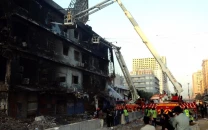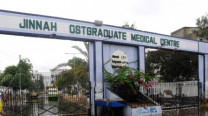Serious gaps in census planning pointed out
These gaps may affect credibility of the exercise in some areas: Senate panel

Public urged to cooperate with field teams and register their complaints at local DCOs and DDOs. PHOTO: FILE
Issues — like counting of the Temporarily Displaced Persons (TDPs), insufficient census blocks and absence of post-census enumerations survey for crosschecking of facts – were highlighted as ‘matters of concern’ in a meeting of Senate Standing Committee on Finance and Statistics, held on Monday.
The senators observed that if the Pakistan Bureau of Statistics (PBS) — the body responsible for holding census — left these matters unaddressed, the credibility of the exercise at the Federally Administrated Tribal Areas (Fata) and some parts of Sindh might be called into question at global forums.
Govt redefines literacy for count
The committee meeting was called to prepare a report for the consideration of the upper house of parliament after Senator Saleh Shah, elected from the Federally Administered Tribal Areas (Fata), raised the issue of counting of the TDPs affected by the Operation Zarb-e-Azb.
Out of the five tehsils of South Waristan Agency, people have not returned to their homes in three tehsils due to lack of community infrastructure, said Shah while explaining the ground realities in areas worst affected by the military’s cleansing up operation.
He said in order to count the tribal people, the PBS-prepared special form should be distributed across the country – a demand that the PBS immediately rejected. At one stage, Senator Shah hinted at boycotting the exercise.
The Chief Census Commissioner Asif Bajwa said that out of seven tribal agencies, as many as three were still disturbed. Bajwa said the PBS sent this special form to the Fata Secretariat but it did not make any progress on that.
He said the Fata Secretariat’s official response was that there were no TDPs in the country after December 31, 2016 – a claim that Bajwa himself admitted was contrary to the reality. The chief census commissioner said a meeting was held in Fata Secretariat on Monday to find a solution to the problem.
Preparations: Officers to start census training
Bajwa suggested using Fata Secretariat’s TDPs data and the Wattan Card information – a special card given to the TDPs for receiving cash assistance – to help count Fata’s people. However, Shah rejected both the options, saying all the tribal people did not register for the card or went to the special camps.
The Census commissioner said after Fata Secretariat’s silence on the matter, the PBS did not print special forms for the TDPs; therefore there was no question for their distribution.
The sixth population census will begin with house-listing on March 15 and will be completed in two phases. The first phase of house-listing will end on March 17, after which census forms – tagged as Form-2 – will be filled from March 18 to 27. Homeless people will be counted on March 28.
However, the senators, notably Senator Saeed Ghani of the PPP, raised the issue of insufficient census blocks. The PBS has divided the country into over 168,017 census blocks. Each block consists of 250 to 300 houses, to be covered by a civilian enumerator who will be accompanied by a military man.
Ghani said a survey carried out by the census staff in Karachi revealed that there was requirement of 45 blocks to timely cover the entire population in an area where the PBS had notified only 13 blocks. “This will make it difficult for the enumerator to timely complete the task,” Ghani said, adding that the basis of block formation was wrong.
Bajwa said this issue of higher than the presumed households in a particular block will be addressed during the house listing exercise, adding that the BPS has sufficient reserve staff to meet the additional work force requirements.
Demographer’s concerns
The standing committee received a presentation from Mehtab S Karim –a member of the government-constituted Expert Committee on Population Census with experience of analysing results of the last two population censuses.
Census 2017: Workshop for master trainers begins
Karim said census exercise might take longer than the planned time in cities due to more numbers of houses in a particular block. He said the PBS should resolve four major issues before entering into the largest ever exercise.
He said absence of any plan for a post-enumeration survey might create credibility issues in the eyes of global agencies, as crosschecking of facts was very important. “Plans for supervision and analysis of data are also missing,” Karim said. “It is necessary to analyse the information on fast track basis,” he added.
His third major concern was that the PBS had not worked out population estimates for each province, which was necessary for better management. The pilot census exercise has not been carried out to know the ground realities, he said.
Karim said the PBS was not collecting the migration data in the upcoming exercise, which was important for better planning. He claimed that in the 1998 population census, the Sindh province’s population was understated by six million people. His claim was based on the analysis of 1998 population data.
Published in The Express Tribune, February 28th, 2017.



















COMMENTS
Comments are moderated and generally will be posted if they are on-topic and not abusive.
For more information, please see our Comments FAQ